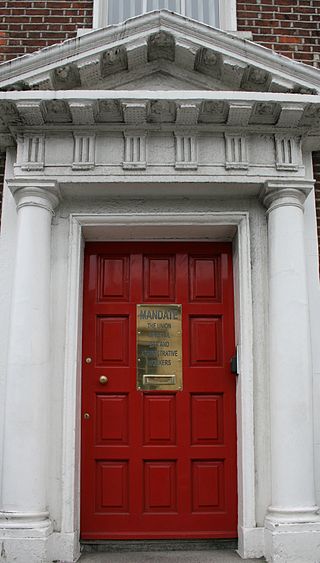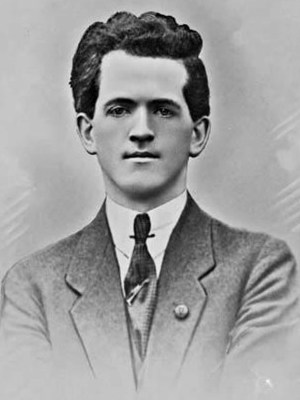Related Research Articles

The Irish Transport and General Workers Union (ITGWU) was a trade union representing workers, initially mainly labourers, in Ireland.

Mandate is a trade union representing retail, administrative and distributive workers in Ireland.

The Civil and Public Services Union (CPSU) was an Irish trade union for clerical and administrative grades in the civil service, the wider public sector and the private sector. It was a member of the Irish Congress of Trade Unions.
The Workers' Union of Ireland (WUI), later the Federated Workers' Union of Ireland, was an Irish trade union formed in 1924. In 1990, it merged with the Irish Transport and General Workers Union to form the Services, Industrial, Professional and Technical Union (SIPTU).
The Congress of Irish Unions was a confederation of trade unions in Ireland.

Patrick Moran was a grocer's assistant, trade unionist and member of the Irish Republican Army executed in Mountjoy Prison along with five other men on 14 March 1921. He is one of those who were dubbed "The Forgotten Ten".
Eamonn Cooney was an Irish revolutionary, politician and trade union official with the Irish National Union of Vintners', Grocers' and Allied Trades Assistants.
The National Union of Gold, Silver and Allied Trades (NUGSAT) was a trade union in Britain and Ireland. It represented workers in precious metals, jewellers, diamond polishers, electroplaters, watch and clock repairers and dental technicians.
The National Amalgamated Union of Shop Assistants, Warehousemen and Clerks was a trade union representing retail workers in the United Kingdom.
The Building and Allied Trades' Union (BATU) is a trade union representing workers in the construction industry and furniture trade in Ireland.

The Irish National Painters' and Decorators' Trade Union (INPDTU) was a trade union representing painters and decorators in Ireland.
The Irish Distributive and Administrative Union (IDATU) was a trade union representing workers in Ireland.
The Amalgamated Union of Co-operative Employees (AUCE) was a trade union representing retail and related staff of co-operative businesses in the United Kingdom.
The National Union of Wallcoverings, Decorative and Allied Trades (NUWDAT) was an industrial union representing workers connected with the manufacture of wallpaper in the United Kingdom.
The Irish Graphical Society was a trade union representing workers in the printing trades in Dublin.
The Electrical Trades Union was a trade union representing electrical technicians and engineers in Ireland.
The Energy Services Union is a trade union representing workers at the ESB Group in Ireland.
The Irish Municipal Employees' Trade Union was a trade union representing employees of Dublin City Council in Ireland.
Walter Herbert Beirne was an Irish trade union leader.
The Irish Bookbinders' and Allied Trades Union was a trade union representing print workers in Ireland.
References
- 1 2 3 4 Arthur Marsh and John B. Smethurst, Historical Directory of Trade Unions, vol.5, p.120
- ↑ Padraig Yeates, A City in Civil War – Dublin 1921–1924: The Irish Civil War
- 1 2 3 4 5 6 7 8 Devine, Francis; Smethurst, John B. (2017). Historical Directory of Trade Unions in Ireland (PDF). Dublin: Irish Labour History Society & Working Class Movement Library. Retrieved 23 January 2025.
- ↑ Evening Herald, 08 February 1932